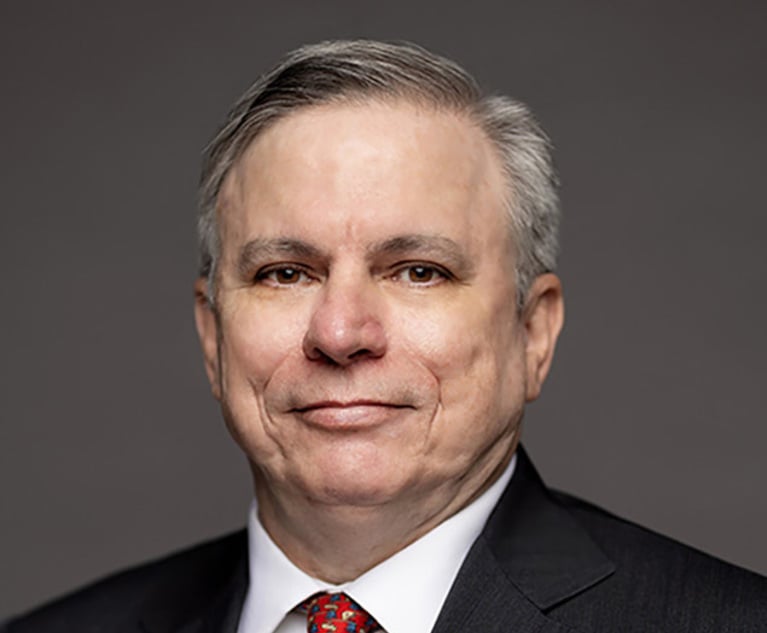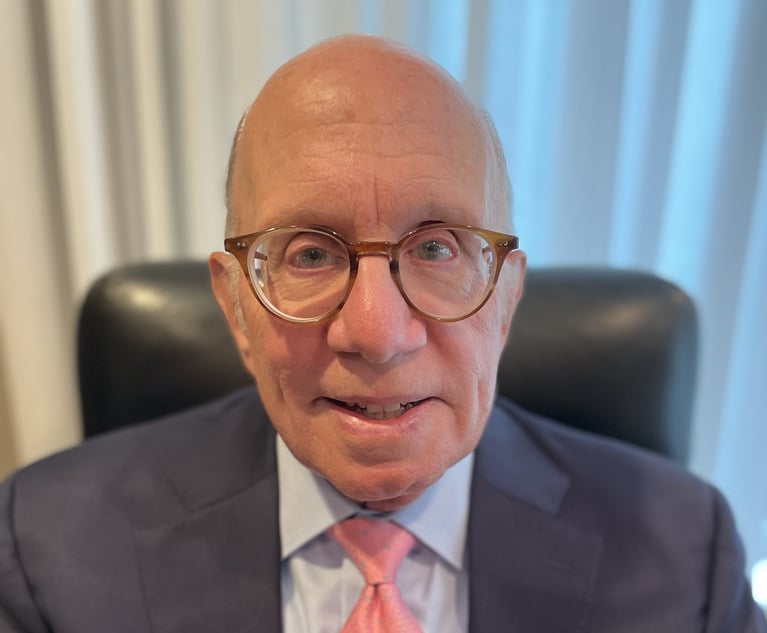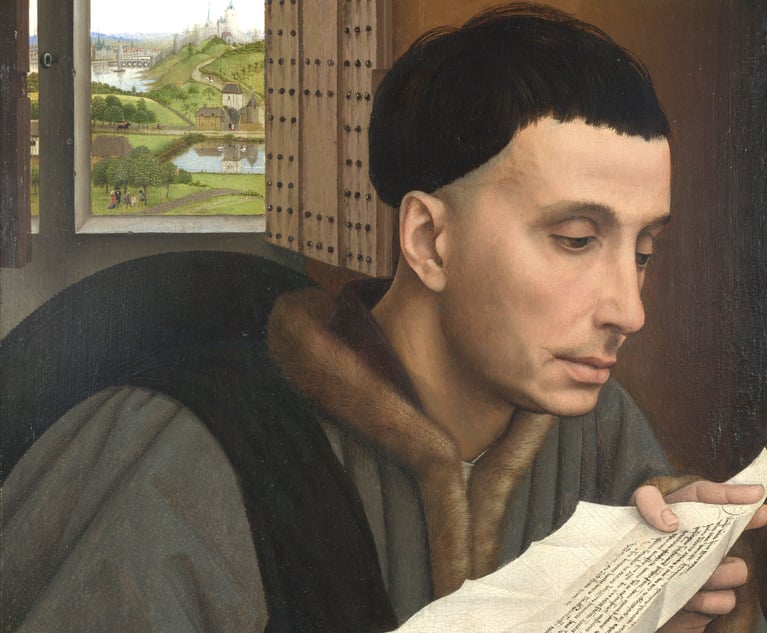 Joel Cohen
Joel CohenMy Morning in the Grand Jury
The prosecutor was utterly fair both to the witness and the targets of the investigation in his questioning. Would this prosecutor have been equally fair had I not been there? Probably so. But didn't my mere presence insist on that fairness, even if I never had reason to say a word or even grimace in his direction?
November 19, 2019 at 11:00 AM
6 minute read
Years ago I was a corruption and then mafia prosecutor over a 10-year span—first for New York state, and later the U.S. Justice Department. Top tier criminal investigations always. I spent more time in investigative grand jury rooms than anywhere else, examining witnesses—crooked police, politicians and mobsters. Witness after witness was hostile to those probes, but no lawyer for any witness ever intruded into the sanctity of the grand jury chamber. The law simply didn't allow it (and from my vantage point, rightly so).
To me, lawyers for witnesses, typically, were simply in the way. They were often, to my mind, "obstructionists" and sometimes even outright suborners. I and my colleagues were invariably frustrated by the constant battle against witness contempt, dissembling, evasiveness and sometimes even outright perjury. These roadblocked our pathway to piercing the omnipresent blue wall of silence, or code of omerta. You know—truth, justice and the American way.
We were self-absorbed enough to believe that witnesses were not (entirely) forthcoming. After all, we, alone knew the truth! Inside the grand jury room, we prosecutors were the judge, jury and sometimes even the executioner (when, as in the Coliseum of old, we subliminally gave a thumbs down when asking the seated jurors to vote). And we were unimpaired by a lawyer for anyone observing the joust. Yes, with the witness alone inside the sanctum—no judge present, to be sure—we might more than sometimes throw hardballs, curve balls and sometimes even spitters designed to extract the truth (you know, the truth that we alone knew).
The grand jury system hasn't changed much from those days, except in one small way. Now, based on a reform of the late '70s, in a very rare circumstance New York law (but not federal) allows a witness to have his lawyer present, that is if he is required to waive immunity before testifying. Indeed, such a request nowadays by a prosecutor is rare indeed—typically only in a very close case where the prosecutor has genuine misgivings about indicting. For example, in the instance of a police shooting that resulted in death, where the officer hopes to talk the grand jury out of indicting and a sympathetic prosecutor encourages him to tell his side of the story to accomplish a "no true" bill.
It is so rare, that those colleagues at the criminal bar whom I unscientifically polled also haven't been inside a grand jury room since they left a prosecutor's office. I, myself, have never represented a witness or defendant in the grand jury room. That is, until now—one morning recently. My client who wasn't hostile in any way to the prosecutor's case, had waived immunity, and so I use the experience to share my observations.
My client was nervous, as would be any witness facing a prosecutor and 23 people staring at him dead on. He later told me, even though under New York law I had no right to object to questions or pretty much do anything while seated nearby (except to privately consult wit him, if necessary), that my mere presence gave him comfort that if he strayed in his testimony I would "be there" to help correct him.
But, here's the real thing. The prosecutor was utterly fair both to the witness and the targets of the investigation in his questioning. Would this prosecutor have been equally fair had I not been there? Probably so. But didn't my mere presence insist on that fairness, even if I never had reason to say a word or even grimace in his direction? When an outside observer or member of the bar is present (even if lined up on the side of the witness), isn't a prosecutor with an "intent"—prosecutors typically present cases to the grand jury with an unadorned "intent" to indict—more likely to toe the line when plying his trade?
I don't suggest here that a subject or target of a grand jury investigation should have a right to have his lawyer present. Too many potential problems with that. Grand juries are empaneled for investigations, not trials. There are obvious security risks in having defense attorneys present that might increase the possibility of obstruction by wayward clients who consequently learn who the witnesses are and what they're saying. And often, the prosecutor won't even know until the investigation's end who the target is.
But, why shouldn't someone, even if not the lawyer for the witness, be present in the grand jury room—if only as a silent policeman to chill a prosecutor willing to leave the straight and narrow? In some bizarre way, even if there was no cause for it that morning, I was the silent policeman. Meaning, if the prosecutor threw a spitball in my presence—even if not thrown at my client—a witness to it was there, even if not an umpire. A knowledgeable "witness" of a different sort.
There are too many instances of prosecutorial abuse in recent years in grand jury rooms—both state and federal. Maybe it's time to take a closer look at additional reforms to ensure that defendants aren't victimized by prosecutors on a wayward mission—or witnesses being pushed by the prosecutor improperly in the direction of the prosecutor's subjective view of the truth. Indeed, one might wonder how many wrongful convictions—say, in one witness identification or circumstantial evidence cases—have resulted from grand jury abuses resulting in indictments that led inexorably to convictions too.
And if one were to argue that a judge will ultimately review the grand jury testimony to ensure fairness in the grand jury presentation, a sterile grand jury transcript doesn't always tell the whole story, not to mention that a defendant will have suffered an indictment that perhaps wouldn't have been brought but for the prosecutor's misconduct. Further, lest it go unsaid, federal prosecutors who can actually indict simply on the basis of hearsay testimony, virtually never have to face a judge's inspection of a grand jury record.
I must admit that there were some moments in my grand jury days that, in retrospect, I'm not totally proud of. Had someone been there—a lawyer, or neutral magistrate of sorts—watching me every time I presented, things might sometimes have been a little different.
Hindsight sometimes yields better vision for the observer of the present.
Joel Cohen, a former New York state and federal prosecutor, is senior counsel at Stroock & Stroock & Lavan, and an adjunct professor at Fordham Law School. He is the author of the newly published I Swear: The Meaning of an Oath (Vandeplas Publishing, 2019)
|This content has been archived. It is available through our partners, LexisNexis® and Bloomberg Law.
To view this content, please continue to their sites.
Not a Lexis Subscriber?
Subscribe Now
Not a Bloomberg Law Subscriber?
Subscribe Now
NOT FOR REPRINT
© 2024 ALM Global, LLC, All Rights Reserved. Request academic re-use from www.copyright.com. All other uses, submit a request to [email protected]. For more information visit Asset & Logo Licensing.
You Might Like
View All
Why Is It Becoming More Difficult for Businesses to Mandate Arbitration of Employment Disputes?
6 minute read
Trending Stories
- 1Gibson Dunn Sued By Crypto Client After Lateral Hire Causes Conflict of Interest
- 2Trump's Solicitor General Expected to 'Flip' Prelogar's Positions at Supreme Court
- 3Pharmacy Lawyers See Promise in NY Regulator's Curbs on PBM Industry
- 4Outgoing USPTO Director Kathi Vidal: ‘We All Want the Country to Be in a Better Place’
- 5Supreme Court Will Review Constitutionality Of FCC's Universal Service Fund
Who Got The Work
Michael G. Bongiorno, Andrew Scott Dulberg and Elizabeth E. Driscoll from Wilmer Cutler Pickering Hale and Dorr have stepped in to represent Symbotic Inc., an A.I.-enabled technology platform that focuses on increasing supply chain efficiency, and other defendants in a pending shareholder derivative lawsuit. The case, filed Oct. 2 in Massachusetts District Court by the Brown Law Firm on behalf of Stephen Austen, accuses certain officers and directors of misleading investors in regard to Symbotic's potential for margin growth by failing to disclose that the company was not equipped to timely deploy its systems or manage expenses through project delays. The case, assigned to U.S. District Judge Nathaniel M. Gorton, is 1:24-cv-12522, Austen v. Cohen et al.
Who Got The Work
Edmund Polubinski and Marie Killmond of Davis Polk & Wardwell have entered appearances for data platform software development company MongoDB and other defendants in a pending shareholder derivative lawsuit. The action, filed Oct. 7 in New York Southern District Court by the Brown Law Firm, accuses the company's directors and/or officers of falsely expressing confidence in the company’s restructuring of its sales incentive plan and downplaying the severity of decreases in its upfront commitments. The case is 1:24-cv-07594, Roy v. Ittycheria et al.
Who Got The Work
Amy O. Bruchs and Kurt F. Ellison of Michael Best & Friedrich have entered appearances for Epic Systems Corp. in a pending employment discrimination lawsuit. The suit was filed Sept. 7 in Wisconsin Western District Court by Levine Eisberner LLC and Siri & Glimstad on behalf of a project manager who claims that he was wrongfully terminated after applying for a religious exemption to the defendant's COVID-19 vaccine mandate. The case, assigned to U.S. Magistrate Judge Anita Marie Boor, is 3:24-cv-00630, Secker, Nathan v. Epic Systems Corporation.
Who Got The Work
David X. Sullivan, Thomas J. Finn and Gregory A. Hall from McCarter & English have entered appearances for Sunrun Installation Services in a pending civil rights lawsuit. The complaint was filed Sept. 4 in Connecticut District Court by attorney Robert M. Berke on behalf of former employee George Edward Steins, who was arrested and charged with employing an unregistered home improvement salesperson. The complaint alleges that had Sunrun informed the Connecticut Department of Consumer Protection that the plaintiff's employment had ended in 2017 and that he no longer held Sunrun's home improvement contractor license, he would not have been hit with charges, which were dismissed in May 2024. The case, assigned to U.S. District Judge Jeffrey A. Meyer, is 3:24-cv-01423, Steins v. Sunrun, Inc. et al.
Who Got The Work
Greenberg Traurig shareholder Joshua L. Raskin has entered an appearance for boohoo.com UK Ltd. in a pending patent infringement lawsuit. The suit, filed Sept. 3 in Texas Eastern District Court by Rozier Hardt McDonough on behalf of Alto Dynamics, asserts five patents related to an online shopping platform. The case, assigned to U.S. District Judge Rodney Gilstrap, is 2:24-cv-00719, Alto Dynamics, LLC v. boohoo.com UK Limited.
Featured Firms
Law Offices of Gary Martin Hays & Associates, P.C.
(470) 294-1674
Law Offices of Mark E. Salomone
(857) 444-6468
Smith & Hassler
(713) 739-1250








